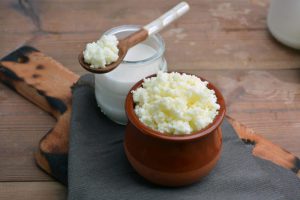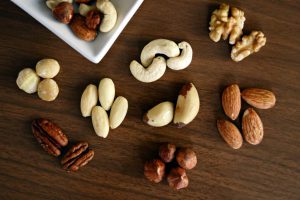Foods with high anti-inflammatory properties

We are what we eat. This popular expression, belonging to the German philosopher and anthropologist Ludwig Feuerbach, perfectly captures the medicinal power of certain foods. A great example of this is anti-inflammatory foods, the regular intake of which reduces inflammation and helps body cells to repair, thus preventing numerous health issues.
Chronic tissue inflammation may lead to a large number of illnesses and shorter life expectancy. As is often the case, the solution is provided by nature in the form of anti-inflammatory foods that protect our bodies from countless ailments.
Ginger
Ginger can often be consumed as an herbal infusion or directly added to food. If you like spicy flavours, ginger is a great option. The gingerols and shogaols it contains make it one of the most anti-inflammatory foods in existence.
Broccoli
Broccoli is a vegetable that provides beneficial nutrients for maintaining healthy and strong bones. It is an excellent source of phosphorus, calcium, zinc and magnesium. But that’s not all – it also helps protect our eyesight with vitamin A and beta-carotene.
Another of its most appreciated properties is its anti-inflammatory capacity, which is due to quercetin, a common pigment in fruits and vegetables that is also a powerful antioxidant. Ideally, it should be eaten as raw as possible as this ensures it does not lose its beneficial qualities.
Green tea
This herb is one of the most consumed in Asia and usually consumed as an infusion. It is a leaf rich in flavonoids and antioxidants, and recent studies have linked its consumption to lower prostate inflammation and a lower likelihood of prostate cancer.
Combining its effects with ginger produces a healthy drink with powerful anti-inflammatory properties. However, it should be noted that green tea also reduces iron absorption, so it is not recommended for people suffering from anaemia.
Blueberries
Blueberries have anti-inflammatory properties thanks to their high content of flavonoids and anthocyanins. Its polyphenols are very beneficial for the body, specifically with regards to platelet performance, vasodilatory actions, tissue inflammation, fibromyalgia, diarrhoea, and oral infections.
Other positive effects on the body are the improvement of cognitive functions, capillary strengthening, and diuretic action.
Nuts
In general, any food with large amounts of omega-3 will have a high anti-inflammatory power. This fatty acid is present in oily fish, numerous oils such as flaxseed or soybean, and various seeds. Omega-3 is also found in certain foods that have been artificially enhanced with it, such as cereals, yoghurts and other dairy products.
In addition, just a handful of nuts will improve our cardiovascular health and reduce our levels of bad cholesterol (LDL) and hypertension. Furthermore, they are an effective barrier against the appearance of arteriosclerosis and an essential nutrient for the proper functioning of our brain.
Turmeric
Of all the foods with anti-inflammatory capacity, turmeric is perhaps the best known, and its popularity is more than justified. It is native to the Asian continent and its use has been documented for over four thousand years. Among its benefits, it stands out as a natural remedy for stomach pain and other digestive tract disorders.
It is also recommended for people who suffer from lack of appetite, slow digestion or flatulence. In addition, this spice stimulates the production of pancreatic and intestinal juices.
Cherries
Like the blueberry, cherries are included in the berry family. It is a red fruit and is notable for its high content of flavonoids, in particular anthocyanins and ellagic acid (polyphenol). It is beneficial for the circulatory system and an effective remedy for preventing heart disease and infections.
If you include cherries in your daily diet, your body should benefit from a well-regulated intestine, reduced muscular inflammation, and improved memory. Furthermore, a cherry’s melatonin will help produce a well-regulated sleep cycle.
Oregano
Oregano is a star spice in any Spanish pantry and used to season countless dishes of Mediterranean origin.
Studies from the University of Bonn in Germany and ETH in Switzerland, revealed that its high content of beta-caryophyllene endows it with strong anti-inflammatory properties, and is therefore of great help to patients with arteriosclerosis and osteoporosis.
It can also help combat other respiratory health issues such as bronchitis or sore throats. Its nutrients include fibre, iron, vitamin E, manganese, calcium, omega-3 fatty acids and vitamin K.
Spinach
Green leafy vegetables are all excellent anti-inflammatory foods. Spinach in particular provide the body with a lots of carotenoids and flavonoids, as well as fatty acids such as omega-3, vitamins A and C, and a large amount of calcium.
Spinach is often included in slimming diets because of its low calorie content and powerful antioxidant properties.
Pineapple
This tasty and refreshing fruit is also one of our best allies when it comes to fighting any inflammation. It possesses an enzyme called bromelain that prevents blood clotting and slows down the adhesion of platelets to blood vessel walls.
Like spinach, it is low in calories and rich in fibre and water. It has high detoxifying and diuretic powers. It also contains vitamins C, B6 and B1, cholic acid, potassium, sodium, magnesium, manganese, iron and calcium.




